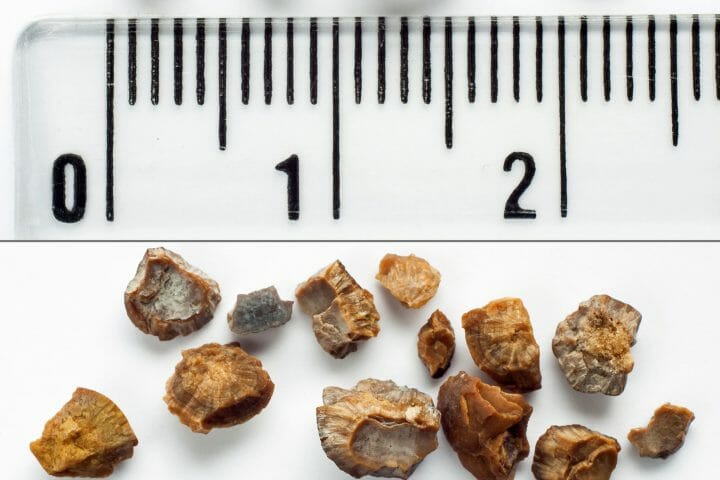Kidney stones can cause excruciating pain and leave you unable to do your work properly. But can you get disability for kidney stones, or are they considered a temporary disability by the SSA? Let’s find out.
Contents
Kidney stones are small lumps in the kidneys of our body. If you want to know whether you are eligible for getting disability for kidney stones or not you must go through the Blue Book of SSA. If you go through the listings of the book you will understand that the social security administration does not list kidney stones as a disability.
Some people believe that you can get disability for kidney stones. The problem is that there is no clear answer as to whether or not this is actually true.
Some people may be able to get disability based on their health condition, while other people may not be able to get disability at all. It is important to speak with a medical professional if you are considering filing for disability based on your kidney stone condition.

What Are Kidney Stones?
Kidney stones are salts and minerals from our body that collect over time and deposit in the kidneys. Once these kidney stones get big enough, they can cause immense pain to an individual.
Working and leading a regular routine with kidney stones can be very difficult. You can easily remove these kidney stones without any permanent damage if you recognize them at an early stage.
Passing kidney stones with the help of water and some medicines is an effective and natural way of removing these stones from your body. Sometimes these kidney stones can get stuck in the urinary tract. As a result, the patient has to get surgery.
Kidney stones can damage the urinary tract. These kidney stones form when the urine becomes concentrated, due to which the salts and minerals in the body crystallize and get hard. After crystallization, these minerals also stick together.
There are also other types of kidney stones. Mostly the kidney stones found commonly are calcium kidney stones. They are made from calcium oxalate deposits in the kidney.
You might also like to read: How To Improve Kidney Function In the Elderly?
What Causes Kidney Stones?
There can be a lot of plausible reasons for kidney stones. We will highlight the top causes or reasons that can lead to the development of kidney stones.

- Less water consumption:- People who drink less water are at risk of kidney stones. The excess salt and minerals in their body remain there and are not removed with the water.
- Exercising:- A person can suffer from kidney stones even if they exercise too much or too little. The minerals in the body are produced in excess in both conditions.
- Obesity:- Excess weight is a primary reason for kidney stones. People that are obese are also less likely to exercise. Due to this, they have more mineral deposits in their kidneys.
- Too much salt or sugar:- Overeating salt or sugar in your food can also harm your kidneys. Salt and sugar are minerals that we consume, and if our body cannot digest or break them down, it is harmful to us.
- Hereditary:- Sometimes, people suffer from conditions like kidney stones because it runs in their family. Some traits are passed down to generations.
- Fructose:- Excess consumption of fructose can also lead to kidney stones. Fructose is a sweet compound available in house sugar and corn syrup.

What Are The Symptoms Of Kidney Stones?
The symptoms of your kidney stones are again dependent on their size. Some kidney stones can be smaller in nature, such as a grain of sand. On the other hand, some kidney stones can be as large as a pebble. They can be as big as a golf ball in very rare cases.
If you have a prominent kidney stone, your symptoms will be more noticeable. Some of the most common symptoms of kidney stones are:-
- Excess lower back pain on either side of the body.
- Persistent stomach ache that doesn’t go away.
- Traces of blood in the urine.
- Feeling of nausea
- Vomiting
- Frequent cases of fevers and chills
- Urine with a foul smell or with a cloudy appearance.
The kidney stones will start to hurt when they grow big enough to block something or cause irritation. The severity of your pain is also an indicator of the size of the kidney stone in your body.
You might also like to read: Can You Get Disability For Pancreatitis?
What Are Social Security Disability Benefits?
Social Security disability benefits are a monthly payment made to people who are unable to work because of a physical impairment. To be eligible for benefits, you must have been out of work for at least 12 months, and your physical impairment must be severe enough that you cannot perform any type of job.
The application process can be complicated, so it is important to consult with an attorney who specializes in Social Security disability law. The attorney can help you gather the necessary documentation and submit a strong application.
If your application is approved, you will receive monthly payments until you are able to return to work. These payments can provide much-needed financial assistance during a difficult time.

What Symptoms Do I Need to Qualify for Social Security Disability Benefits?
The SSA uses a five-step evaluation process to determine if you are eligible for benefits. The first step is to determine if you have a medically determinable impairment. The second step is to determine the severity of your impairment. The third step is to determine if your impairment meets or equals one of the impairments listed in the Blue Book. The fourth step is to assess your residual functional capacity (RFC). The fifth step in this process is to determine if you are disabled.
To be considered disabled, you must be unable to do any substantial work because of your medical condition(s). The SSA considers your age, education, and work experience when making this determination.
If you are found to be disabled, the SSA will award benefits based on your work history and family size.
Some of the symptoms to be eligible for disability benefits are:-
- Infections in the urine tract.
- Blood in the urine.
- Pain in the lower back.
- Swelling in the kidney.
You might also like to read: Can You Get Disability Benefits For High Blood Pressure?
What Is The Social Security Disability For Kidney Disease?
Kidney disease is a serious medical condition that can lead to kidney failure and require dialysis treatments. Social Security Disability Insurance (SSDI) benefits may be available to those who are unable to work due to their illness. To qualify for SSDI benefits, you must have a qualifying medical condition and meet the work requirements.
The most common cause of kidney failure is chronic kidney disease, which is caused by damage to the kidneys over time. Other causes of kidney failure include kidney stones and acute renal failure, which can occur after a sudden illness or injury.
If you have chronic kidney disease, you may be eligible for SSDI benefits if your doctor has determined that you are unable to work due to your illness. In order to qualify for benefits, you must have worked in the past and paid into the Social Security system.
If you want SSA to grant disability benefits to an individual with kidney stones, then if the applicant has any of the following:-

- The patient needs regular dialysis while working.
- If the patient also has a kidney transplant.
- If the applicant has reduced fibrosis in combination with some damage to the kidneys.
- Nephrotic syndrome
- Some severe impairment of the kidneys.
File Application for Social Security Disability Benefits with Kidney Disease
You can file an application for Social Security disability while suffering kidney impairments by using the local social security administration office. You can even apply for these benefits through their online website portal.
You will have to fill in all your information in detail. This should also include all the previous medical records and the applicant’s contact information. Ideally, you should also have instances of bone pain, fatigue, and other cases in which kidney stones will affect the applicant’s work performance.
Can I Get Disability Benefits for Recurrent Kidney Stones?
No, getting social security disability benefits for recurrent kidney stones is difficult. Recurrent kidney stones are also known as chronic nephrolithiasis, which is an extremely painful impairment. A patient suffering from this condition must pass multiple stones monthly.
Passing a stone can be very painful in some cases. A person suffering from kidney stones will need about two days off in a month due to their condition. Any employer can start objecting if an employee is going to miss time off their work.
You might also like to read: Can You Get Disability For Fatty Liver Disease?
What is the VA Rating for Kidney Stones?
The social security administration uses different methods to classify kidney diseases. Similarly, it also has separate ratings for kidney impairments.
- The applicant will receive a 30% eating if they need any of these treatments:- a drug therapy, change of diet, a surgical or a non-surgical procedure at least twice a year.
- Suppose the applicant suffers from a kidney impairment because of an injury during service time. In that case, they must provide evidence of their claims to be eligible for disability benefits.

Can You Get A VA Disability Rating For Kidney Stones?
Yes, you can get a VA disability rating for having kidney stones. You will have to submit some proof that will state that you suffer from this kidney condition because of an incident that happened while you were at service.
If your kidney condition is a consequence of a physical or mental injury while you were at service, you will qualify for VA disability benefits. It is a great idea to hire a lawyer before you file a claim for your disability benefits. A lawyer will guide you through the entire process and help you strengthen your case.
There will also be a compensation and pension exam that you will need to take. Taking this exam is necessary for the evaluation of your claims. The examiner will give you disability ratings based on your condition. If they feel you qualify per the requirements, you will receive the disability claim.
The examiner will discuss your routine and joint symptoms. They will also ask you about your daily problems because of your condition. So it is better to be ready with such answers before you go to give this exam.
Lab results and proper medical documentation will help you by making your claim stronger.
Frequently Asked Questions
Are kidney stones a severe health condition?
Kidney stones can be a severe health condition in some rare cases. It is often not a serious condition and can easily be cured. You should figure out that you are suffering from this problem early to remove these kidney stones without any hassle.
Kidney stones can result in permanent damage if they cause repeated infection. Blocking of the tracts by kidney stones is also a significant concern. Over a long time, when the kidney stones block the lots then, it can lead to the kidney stopping working.
What happens if you don’t remove kidney stones?
If you plan to leave kidney stones as it is in your body, then it is not a great idea. Kidney stones, if left untreated, can also lead to permanent damage to the organs such as the kidneys and the urinary tract.
A person can suffer from internal bleeding or recurrent urine infections. Infections are not suitable for the body as they weaken the immune system over time. Kidney stones can also lead to sepsis, a severe and life-threatening condition. If you ignore kidney stones for too long, you can also lose a kidney. However, you can leave very small kidney stones inside if they are not causing any pain. Just keep monitoring whether they are growing or not.
Which painkiller is best for kidney stones?
Once the kidney stones grow too large, they can cause much pain. Some people are not even able to move correctly because of their kidney stones. You must opt for painkillers while treating kidney stones. You should take medicines that have salts, such as acetaminophen, ibuprofen, or naproxen. Some common examples of these medicine salts are Advil, Motrin IB, Tylenol, etc.
Alpha-blockers are known for relaxing the muscles of an individual. These blockers will help the body to naturally pass out kidney stones. Some doctors even like to prescribe alpha-blockers to their patients.
What are the long-term consequences of kidney stones?
The long-term effects of kidney stones will depend on the type and size of kidney stones you have in your body. Smaller kidney stones have no ill effect on the body. They can be left as they are until they grow or start hurting you.
If these stones are not taken care of properly, they can lead to permanent damage to the organs and, in very severe cases, the loss of a kidney. Kidney stones directly impact the urinary tracts and lower abdomen portion of our body.
Wrap Up
Kidney stones are not taken to be a disability by the social security administration. Still, if it is combined with any other physical and mental impairment, a person is eligible for disability benefits. Doctors don’t consider kidney stones a disability as it is not a chronic condition in most cases. Many cases of kidney stones are easily treated upon identification. This article is the ultimate guide to help you claim social security disability benefits for kidney stones.

